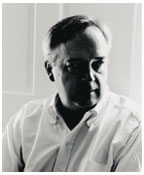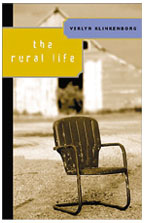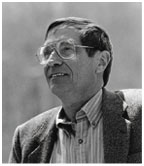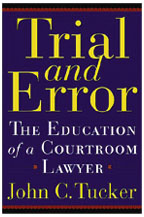 May
14, 2003: Reading
Room
May
14, 2003: Reading
Room
Pigs,
hay, and grasshoppers
Verlyn Klinkenborg *82 is
keen observer of the rural life
Photo: A member of the New York Times’s editorial board, Verlyn Klinkenborg *82 lives on a farm in upstate New York. (lindy smith)
| From The Rural Life: “If deep cold made a sound, it would be the scissoring and gnashing of a skater’s blades against hard gray ice, or the screeching the snow sets up when you walk across it in the blue light of afternoon. The sound might be the stamping of feet at bus stops and train stations, or the way the almost perfect clarity of the audible world on an icy day is muted by scarves and mufflers pulled up over the face and around the ears. But the true sound of deep cold is the sound of the wind.” |
Many city and suburban dwellers learn about the smell of rain, the trials of mud season, and the scent of new beeswax through Verlyn Klinkenborg *82’s poetic essays — printed under the rubric The Rural Life — which appear from time to time at the bottom of the New York Times editorial page. Through his finely drawn observations, readers get a break from the stress of daily life and reflect for a few moments on the pleasures of life on a farm.
 The
Rural Life, published this year by Little, Brown and Company, is a
collection of those essays.
The
Rural Life, published this year by Little, Brown and Company, is a
collection of those essays.
Klinkenborg and his wife, a photographer, live in an old house on a five-acre farm in upstate New York with three horses, two dogs, three cats, and 30 chickens. They keep bees and grow flowers and vegetables. This summer, pigs will join the lot, says Klinkenborg, who grew up in small-town Iowa.
As a youth, he says, his life was “divided between reading and roaming outside.” At Princeton, he earned a Ph.D. in English, focusing on 18th-century literature. Not long after graduate school, while he was teaching at Fordham, he says, “I had this real longing for something larger than the library,” and he visited family members and friends who were farming in Minnesota, Iowa, and Montana, to help with haying. This led him to write about hay farmers in his first book, Making Hay (1986).
“People tend to think that the country is a very simple place compared with the city. It’s not. It’s every bit as sophisticated in its own ways and as complicated in its own ways as urban living is,” says Klinkenborg.
What he loves most about living in the country are the animals, even the wild ones. Klinkenborg mentions the turkeys that come down his driveway almost every morning in early April and fold themselves right into his life. Klinkenborg and his wife “use [animals] almost as antennae,” he says. “They reflect the world they live in to us. As a result we get to see much more than we would if they weren’t there.”
A member of the Times’s editorial board since 1997, Klinkenborg also writes unsigned editorials, focusing on “the large national emotional issues,” he says. “I wrote a lot about 9/11, for example.” And he tries to capture “how it feels to be passing through this moment in our history.”
Critics compare his work to that of Henry David Thoreau. “When people read me they find themselves thinking about their own lives, and I think that’s the impact Thoreau has on a lot of people,” says Klinkenborg.
Living on the land, he says, affects the way you look at the world. It has “made me much more intensely focused on agricultural issues in the U.S. and . . . on issues of land preservation and land use, and made me much more conscious of the degree to which development is devouring this country,” he says.
By K.F.G.
 The
making of a trial lawyer
The
making of a trial lawyer
John Tucker ’55 chronicles
the ups and downs of his legal battles
Photo: As a trial attorney, John Tucker ’55 says, he “tended to be a bit flamboyant.” (david doody)
Many people learn about the world of trial lawyers through TV shows like The Practice or Law & Order. In his new memoir, Trial and Error: The Education of a Courtroom Lawyer (Carroll & Graf), John C. Tucker ’55, who twice argued before the Supreme Court, chronicles his own courtroom dramas, including the criminal representation of indigents; the representation of government employees fired for political reasons; and the defense of the “Chicago Seven” antiwar protestors — and their attorneys. A leading trial lawyer with a Chicago law firm, he left the profession in 1985 to become a full-time writer. Tucker spoke with PAW contributor Louis Jacobson ’92. Go to www.princeton. edu/paw for the complete interview.
Did you ever ask your clients if they were guilty?
I absolutely didn’t ask. What you have to do is make the client understand that it will be counterproductive to bullshit you, to claim an alibi that doesn’t exist, or to make up a piece of evidence. But at the same time, you have to ask it in a way that makes clear that they can say, “I don’t want to answer that,” or “I don’t know the answer,” so they don’t have to confess to you.
Even if I thought someone was guilty, I would represent them. To me, guilt is not a disqualifier. Guilt is not for me to decide. It’s for the jury or a judge to decide.
 In
your book you discuss a variety of cases. Which one most affected your
approach to the law?
In
your book you discuss a variety of cases. Which one most affected your
approach to the law?
The Contract Buyers League trial on behalf of African Americans who were charged excessive prices for their homes in Chicago’s segregated housing market. It’s the case I cared about the most, and the only one I can recall losing when I thought I should have won — and believed I had won, right up until the jury’s verdict was announced. I was devastated. It made me realize that our legal system doesn’t always produce justice.
How much faith do you have in our criminal justice system today?
It depends. I frankly have less faith now than I did when I was practicing. There’s a lot of misunderstanding about DNA evidence. I think an awful lot of people believe we’re not going to convict innocent people anymore because DNA evidence will clear them. It’s a wonderful tool for both the defense and the prosecution if it exists, and it usually does in rape cases. But it’s there in murder cases only some of the time, and it almost never exists in other kinds of crimes. The results of DNA testing have been shocking to me, in terms of the number of cases where it has been shown that someone who was factually innocent was convicted anyway — 25 percent of the time, according to one study.
On the other hand, I don’t know of any better system. When both sides have good lawyers and decent investigators and law-enforcement people who tell the truth on the witness stand and don’t make up evidence, then it works as well as any system I could devise. But those conditions do not always exist. There’s frequently a vast difference in the resources and abilities of the lawyers in cases where people are not very wealthy.
Book Shorts
 The Magic
Window: American Television, 1939-1953 — James Von Schilling
’70 (Haworth). This book describes the early history of television
in America, beginning with its debut at the 1939 World’s Fair. Von
Schilling discusses the gradual acceptance of television into American
culture through the stories of entertainment personalities, early programs,
and political events that marked that period. Von Schilling is a professor
of English at Northampton Community College in Pennsylvania.
The Magic
Window: American Television, 1939-1953 — James Von Schilling
’70 (Haworth). This book describes the early history of television
in America, beginning with its debut at the 1939 World’s Fair. Von
Schilling discusses the gradual acceptance of television into American
culture through the stories of entertainment personalities, early programs,
and political events that marked that period. Von Schilling is a professor
of English at Northampton Community College in Pennsylvania.
 The Pearl
of Kuwait — Tom Paine ’84 (Harcourt). Paine’s first
novel is the comic story of two marine privates, Tommy Trang, the love
child of a former Vietnam War marine, and Cody Carmichael, a California
surfer, who fight in the 1991 Gulf War. When Trang falls for Lulu, a 16-year-old
Kuwaiti princess trapped in Iraqi-occupied Kuwait, the two marines go
AWOL to sneak behind enemy lines and rescue her. Paine, the author of
Scar Vegas (2000), a collection of short stories, teaches creative writing
at Middlebury College.
The Pearl
of Kuwait — Tom Paine ’84 (Harcourt). Paine’s first
novel is the comic story of two marine privates, Tommy Trang, the love
child of a former Vietnam War marine, and Cody Carmichael, a California
surfer, who fight in the 1991 Gulf War. When Trang falls for Lulu, a 16-year-old
Kuwaiti princess trapped in Iraqi-occupied Kuwait, the two marines go
AWOL to sneak behind enemy lines and rescue her. Paine, the author of
Scar Vegas (2000), a collection of short stories, teaches creative writing
at Middlebury College.
 Red Meat Cures
Cancer — Starbuck O’Dwyer ’89 (Midnight). A satire
of the fast-food industry and its place in pop culture, O’Dwyer’s
first novel traces fast-food giant Sky Thorne in his struggle to increase
the market share of his restaurant chain, Tailburger, in the face of growing
opposition from health-food advocates. Thorne decides to drop the pretense
that fast food is healthy in favor of a “Torture Your Body”
ad campaign. O’Dwyer is a corporate health care attorney in Washington,
D.C. For a story on O’Dwyer, go to www.princeton.edu/paw.
Red Meat Cures
Cancer — Starbuck O’Dwyer ’89 (Midnight). A satire
of the fast-food industry and its place in pop culture, O’Dwyer’s
first novel traces fast-food giant Sky Thorne in his struggle to increase
the market share of his restaurant chain, Tailburger, in the face of growing
opposition from health-food advocates. Thorne decides to drop the pretense
that fast food is healthy in favor of a “Torture Your Body”
ad campaign. O’Dwyer is a corporate health care attorney in Washington,
D.C. For a story on O’Dwyer, go to www.princeton.edu/paw.
 Alpha & Omega:
The Search for the Beginning and End of the Universe — Charles
Seife ’93 (Viking). Seife explores discoveries and observations that
have led to a major shift in our understanding of the universe, shedding
light on theories from the Copernican model to the Big Bang. Among other
things, he explains the significance of the spectacular images of the
cosmic microwave background (the faint, ubiquitous afterglow of the Big
Bang) and the discovery that neutrinos have mass. Seife, the author of
Zero: The Biography of a Dangerous Idea (2000), is a science journalist
in Washington, D.C.
Alpha & Omega:
The Search for the Beginning and End of the Universe — Charles
Seife ’93 (Viking). Seife explores discoveries and observations that
have led to a major shift in our understanding of the universe, shedding
light on theories from the Copernican model to the Big Bang. Among other
things, he explains the significance of the spectacular images of the
cosmic microwave background (the faint, ubiquitous afterglow of the Big
Bang) and the discovery that neutrinos have mass. Seife, the author of
Zero: The Biography of a Dangerous Idea (2000), is a science journalist
in Washington, D.C.
 Pushing Time
Away: My Grandfather and the Tragedy of Jewish Vienna — Peter
Singer (Ecco). In this book that explores the life and times of David
Oppenheim, Peter Singer’s grandfather, who was a classicist and occasional
collaborator with Sigmund Freud, Singer reflects on issues ranging from
ethics to psychoanalytic theory. He finds in the life of Oppenheim, who
died in a Nazi concentration camp, many parallels to his own. Singer is
the Ira W. DeCamp Professor of Bio-ethics. By Jeanne Alnot ’04
Pushing Time
Away: My Grandfather and the Tragedy of Jewish Vienna — Peter
Singer (Ecco). In this book that explores the life and times of David
Oppenheim, Peter Singer’s grandfather, who was a classicist and occasional
collaborator with Sigmund Freud, Singer reflects on issues ranging from
ethics to psychoanalytic theory. He finds in the life of Oppenheim, who
died in a Nazi concentration camp, many parallels to his own. Singer is
the Ira W. DeCamp Professor of Bio-ethics. By Jeanne Alnot ’04
